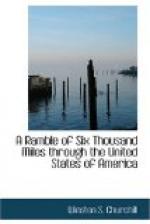The climate of Kentucky is favourable to the growth of hemp, flax, tobacco, and all kinds of grain. The greater portion of the soil is rich loam, black, or mixed with reddish earth, generally to the depth of five or six feet, on a limestone bottom. The produce of corn is about sixty bushels on an average per acre, and of wheat about thirty-five; cotton is partially cultivated. The scenery is varied, and the country well watered.
The Kentuckians all carry large pocket knives, which they never fail to use in a scuffle; and you may see a gentleman seated at the tavern door, balanced on two legs of a chair, picking his teeth with a knife, the blade of which is full six inches long, or cutting the benches, posts, or any thing else that may lie within his reach. Notwithstanding this, the Kentuckians are by no means more quarrelsome than any other people of the western states; and they are vastly less so than the people of Ireland. But when they do commence hostilities, they fight with great bitterness, as do most Americans, biting, gouging, and cutting unrelentingly.
I never went into a court-house in the west in summer, without observing that the judges and lawyers had their feet invariably placed upon the desks before them, and raised much higher than their heads. This, however, is only in the western country; for in the courts at Orleans, New York, and Philadelphia, the greatest order and regularity is observed. I had been told that the judges often slept upon the bench; but I must confess, that although I have entered court-houses at all seasons during the space of fifteen months, I never saw an instance of it. I have frequently remonstrated with the Americans, on the total absence of forms and ceremonies in their courts of justice, and was commonly answered by “Yes, that may be quite necessary in England, in order to overawe a parcel of ignorant creatures, who have no share in making the laws; but with us, a man’s a man, whether he have a silk gown on him or not; and I guess he can decide quite as well without a big wig as with one. You see, we have done with wiggery of all kinds; and if one of our judges were to wear such an appendage, he’d be taken for a merry-andrew, and the court would become a kind of show-box—instead of such arrangements producing with us solemnity, they would produce nothing but laughter, and the greatest possible irregularity.”
I was present at an election in the interior of the state. The office was that of representative in the state legislature, and the candidates were a hatter and a saddler; the former was also a militia major, and a Methodist preacher, of the Percival and Gordon school, who eschewed the devil and all the backsliding abominations of the flesh, as in duty bound. Sundry “stump orations” were delivered on the occasion, for the enlightenment of the electors; and towards the close of the proceedings, by way of an appropriate finale, the aforesaid triune-citizen




